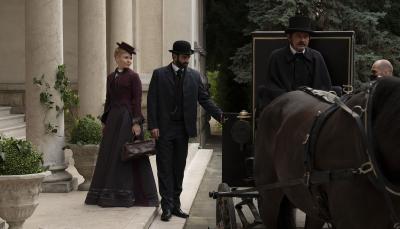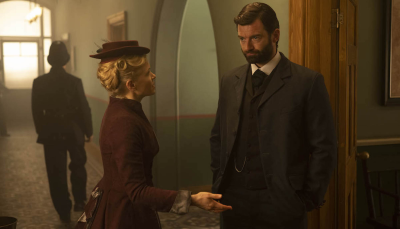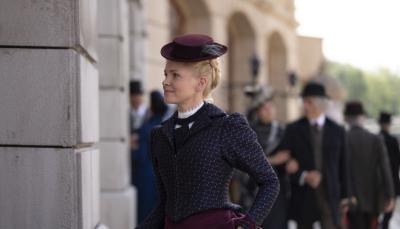William and Eliza are on Opposite Sides in the Search for "The Black Witch Moth"
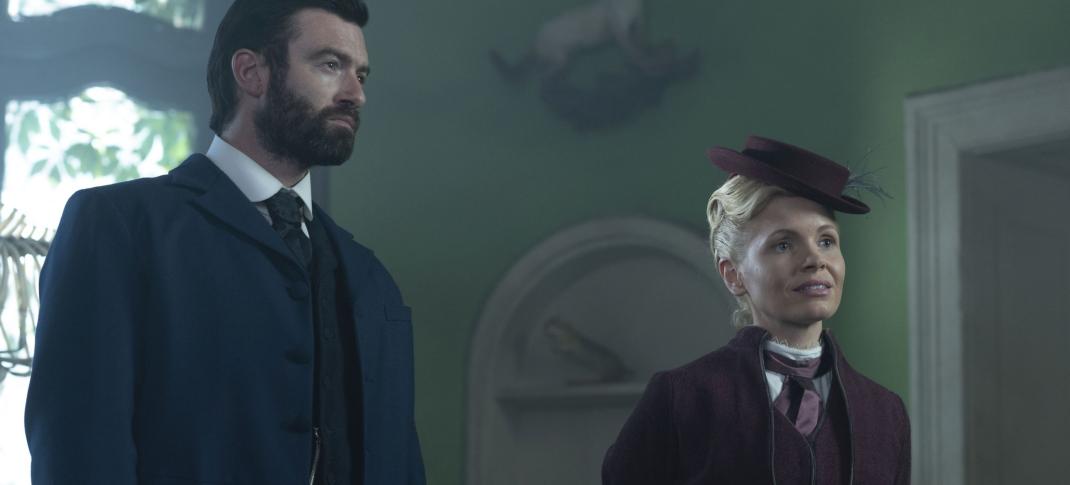
Stuart Martin and Kate Phillips as Eliza Scarlet in 'Miss Scarlet and The Duke' Season 2
(Photo: Courtesy of Element 8 Entertainment/MASTERPIECE)
The second episode of Miss Scarlet & the Duke Season 2 has a little bit of everything: Eliza telling a group of judgy society women about themselves, Hattie getting the chance to help out on a case, a dash of Victorian-era history, and a satisfying mystery that's not actually about the item that goes missing but the larger purpose behind its theft.
The disappearance of a Charles Darwin sketch of a creature known as the Black Witch Moth made during his time on the Galapagos Islands gives this episode its title and focus. Eliza is hired by an insurance company that claims to represent the niche museum from which it was stolen. At the same time, William and Scotland Yard are brought in by Ms. Garrett, the woman who serves as its curator and owner.
Intriguingly, Ms. Garrett is actually Mrs. Dashwood, the wife of a famed naturalist named Thomas, who wasn't too keen on having a spouse whose passion for science turned into a career that could surpass his own. The two are separated because of the vast economic and social expense of divorce. (It's a throwaway line that nevertheless helps firmly establish the unfair stakes women in this period are forced to navigate.)
The Darwin sketch is the only item of real value that her museum has, and naturally, suspicion immediately falls on her (jerk) spouse. Is he petty enough to try to wreck her dream?
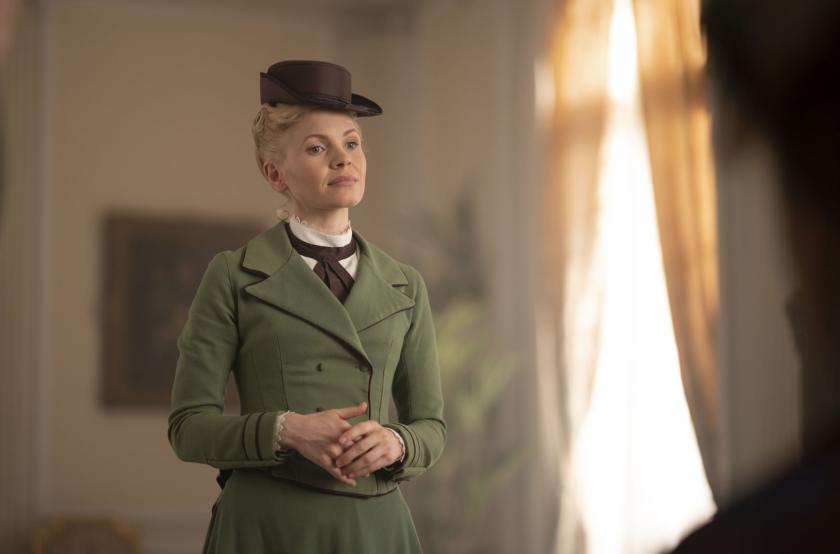
Kate Phillips in "Miss Scarlet and the Duke" Season 2 Episode 2
(Photo: Courtesy of Element 8 Entertainment and MASTERPIECE)
But one of the best things about Miss Scarlet & the Duke is how creator Rachael New uses its mysteries to explore specifically female-focused stories. And in the end, "The Black Witch Moth" is no different, introducing us to multiple women, much like Eliza. They struggle to be taken seriously in a world that isn't particularly interested in seeing women succeed. (Often doing its best to stifle and erase their accomplishments.)
The twist at the heart of this week's mystery — that the Darwin sketch wasn't stolen but hidden in a bid by one woman whose work was ignored to bolster the efforts of two others trying to make names for themselves — is so utterly on-brand for this show, whose stories are so often not about the crimes Eliza must solve but what they reveal about her own character and experience along the way.
The elder Mrs. Dashwood, a talented archaeologist in her own right who saw her contributions to the field ignored by the men she worked with, went to serious lengths to help her daughter-in-law chase her dream of a successful natural history museum. It's a little strange but honestly lovely. (I cannot help but cheer her for realizing what a complete jerk her son has turned out to be!)
Ultimately, she does so using the city's lone female private detective (to help boost her business!), and indulging her love of anagrams and wordplay is the next level icing on the cake. What an icon!
It's not surprising Eliza and William's relationship suddenly seems a little frosty after their mutual decision to keep their relationship strictly platonic and professional last week. But despite both of their best efforts, they end up working on the same case and essentially find themselves on top of one another, looking into various places and people of interest.
But, it's apparent throughout that the two are better together than either of them are apart, as their only real progress in their joint investigations comes when they work together. (Some people might call this fate, is all I'm saying.)
Still, William offers Eliza some surprisingly sage advice by the end of the episode. While it's understandable that she wants to be recognized for her skills as a detective, Eliza will never be able to escape the fact that she is a woman, and that's something that, for good or ill, sets her apart in the profession she's chosen. There's nothing wrong with leaning into that when the situation calls for it.
Yes, she takes cases that other, more experienced, or popular private investigators don't. Yes, her client base frequently includes those who are marginalized, poor, or unable to seek help from other places. But there's nothing intrinsically wrong about those things, and the fact that she solves their cases anyway without judging them for their various situations is nothing but a credit to her.
There's nothing lesser or wrong about being a female detective (as evidenced by Mrs. Parker's revelation that she's hiring Eliza because she's the only detective she knows, regardless of gender!). It's high time Eliza stopped telling herself that there is.
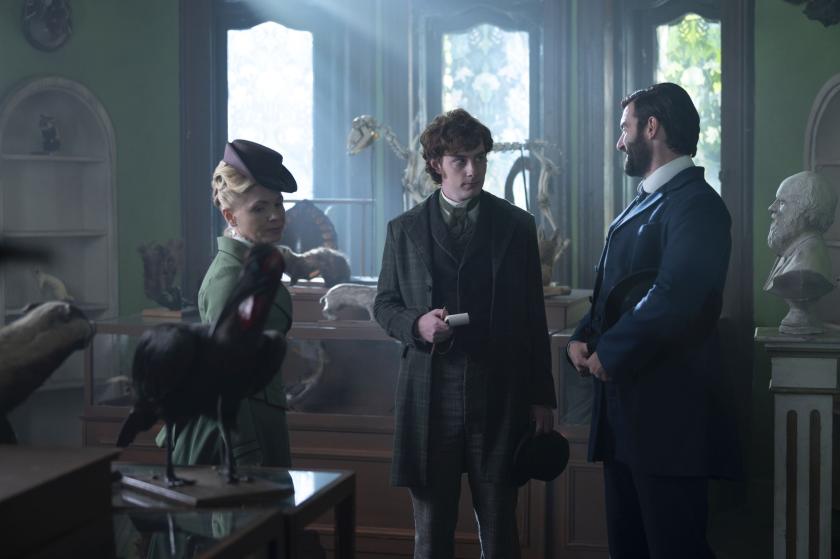
Kate Phillips, Evan McCabe and Stuart Martin in Miss Scarlet & The Duke Season 2
(Photo: Courtesy of Element 8 Entertainment/MASTERPIECE)
We're two episodes into Season 2, and I'm still not entirely sure what I think of the addition of the new detective wannabe Oliver Fitzroy to the cast. There's some biting in-universe commentary here about how this thoroughly mediocre but well-off and well-connected man is being allowed to keep failing upward in the same profession that repeatedly refuses to acknowledge the above-average ability of women like Eliza. But for the most part, it's honestly just sad.
Maybe it's that I don't feel like the show's central duo necessarily needs to be a trio. (Or at least, not with this man, I would admittedly be fine if Moses and Hattie rounded out their group.) Or maybe it's that it feels as though the episode skipped a step. Throughout this installment, we see Fitzroy both falling down drunk and falling down ill. Beyond his insistence that he means to make himself into a good cop to earn the approval of the famous Duke, we've seen little evidence that he's got either the willingness or aptitude to do so. (It seems incredibly likely that one pep talk from William will be enough to cure what is apparently a lifetime of...well. Everything he's done.)
The thing is, I don't mind the version of Fitzroy we saw at the very end of "The Black Witch Moth," a man who seems contrite and determined, a total try-hard looking for a father figure that might give him the sort of approval he never seems to have found anywhere else. But that doesn't mean I think he deserves the position he's found himself in, either.



